

Camp Bosrow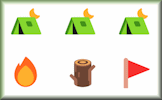
Place the camping items into the plots on the camp site according to the clues given.
Navigation NEWS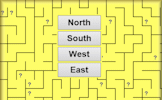
Each visitor to this page has a unique maze constructed for them to find their way through answering questions about bearings along the way.
Bearings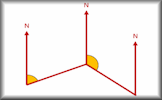
Practise your ability to interpret and use three-figure bearings with this self-marking exercise.
Snooker Angles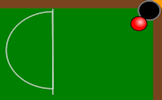
An online game for one or two players requiring an ability to estimate angles as bearings.
This is the main Transum help video on Bearings.
Bearings Video
Find out about bearings and practise estimating, measuring and calculating them.
How to take a Compass Bearing
Steve Backshall teaches you how to use a compass to take a bearing and find out which direction you need to travel.
Plane Bearings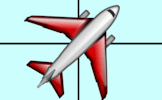
A visual aid designed to help pupils estimate three figure bearings.
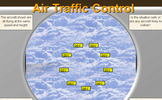
Air Traffic Control
Work out which aircraft are in danger of colliding from their positions and direction of travel. An exercise in understanding bearings.

News Common
Follow the compass directions given in the squares to find where the route starts?
8 items are currently in this category.
Teachers might find the complete Bearings Topic List useful.
A bearing is a description of a direction. It is the number of degrees measured in a clockwise direction from north as seen from above. Convention, probably born out of the need to be quite clear when saying a bearing over a crackly aircraft radio or storm at sea, three figures are given for each bearing. So 90 degrees would be expressed as 090 degrees.
The four main directions are known as the cardinal points. These are north (360°), east (090°), south (180°) and west (270°). The directions in between those are known as the half cardinal points and can be expressed as north-east (045°), south-east (135°), south-west (225°) and north west (315°).
The study of bearings in Mathematics provides a practical, real-life application of angles and geometry. It can provide a need for numerical calculations, scale drawing and estimation.